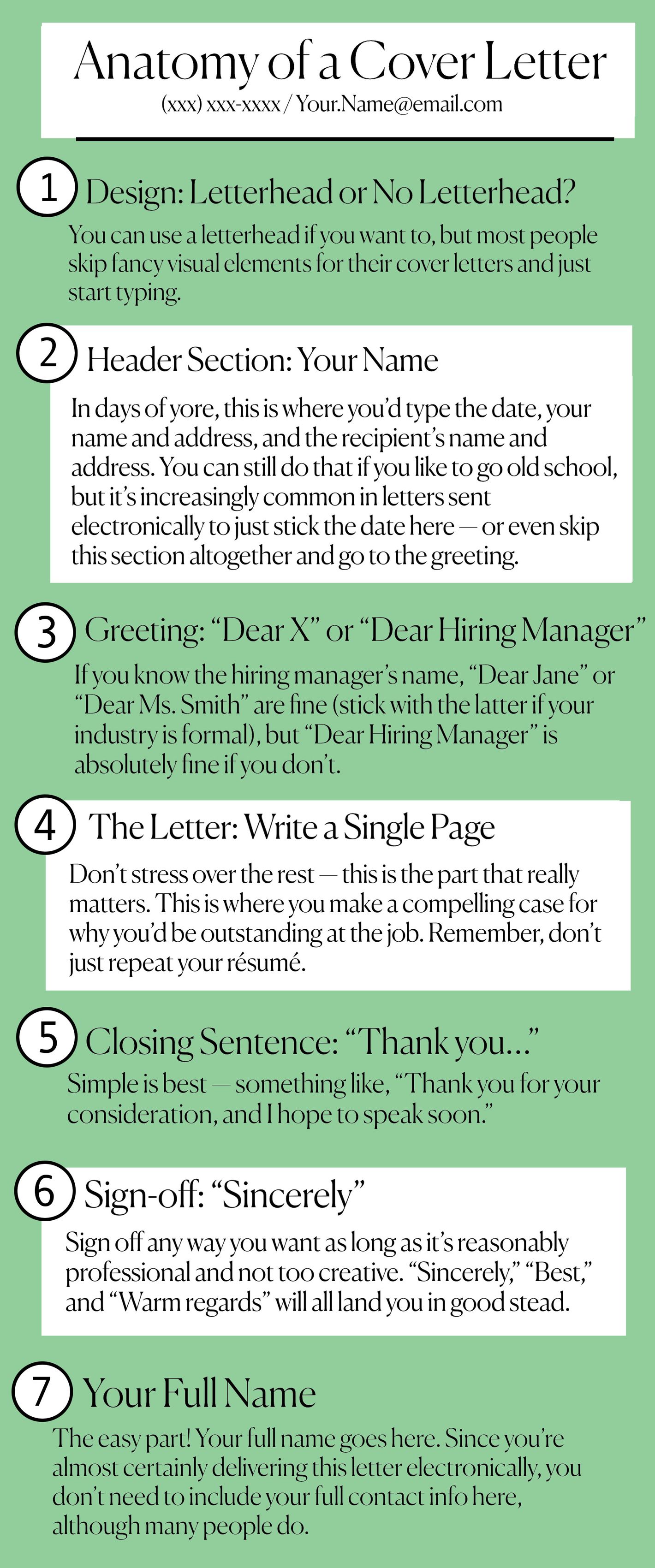
Over the course of my career, I’ve read probably tens of thousands of cover letters. (And yes, that’s as boring as it sounds.) In doing so, what I’ve learned is that most job applicants’ cover letters are truly awful — and as a result, if you’re willing to put in the time to write a good one, you can stand out from your competition in a really effective way.
A great cover letter won’t get you the job if you’re not qualified, but it can make a hiring manager notice you in a sea of applicants and encourage them to interview you when you otherwise might have been overlooked. In fact, a good cover letter can be such an effective way of boosting your application that I’m always amazed by how many candidates don’t bother to take advantage of the opportunity they offer.
Here’s how to do cover letters right.
First, understand the point of a cover letter.
The whole point of including a cover letter — and the whole reason employers ask for them — is that you’re more than just your job history. Your experience is a huge part of what will interest employers, of course, but that doesn’t tell the whole story; hiring managers are also looking for candidates who communicate well, show good judgment, are easy to work with, and all the other things you’d want from your own co-workers. When written well, cover letters can give more of a window on those things than a résumé alone. They can also fill in any blanks and provide context on your candidacy — for example, explaining why you’re interested in this particular job (especially if it doesn’t at first glance look like a natural next step for you).
Because of that …
Whatever you do, don’t just rehash your résumé.
Without question, the biggest mistake people make with cover letters is using them to restate their résumé; no other mistake even comes close to this one in frequency or impact.
Hiring managers don’t need a summary of your résumé! They’re going to see your work history and relevant experience on the very next page. And when you consider that your entire application is only a few pages total (a one- or two-page résumé and a one-page cover letter), it makes no sense to squander space by repeating yourself.
Instead, your cover letter should go beyond your work history to talk about things that make you especially well-suited for the job. For example, if you’re applying for an assistant job that requires being highly organized and you neurotically track your household finances in a multi-tab, color-coded spreadsheet, most hiring managers would love to know that because it says something about the kind of attention to detail you’d bring to the job. That’s not something you could put on your résumé, but it can go in your cover letter.
Or maybe your last boss told you that you were the most accurate data processor she’d ever seen, or came to rely on you as her go-to person whenever a lightning-fast rewrite was needed. Maybe your co-workers called you “the client whisperer” because of your skill in calming worried clients. Maybe you’re regularly sought out by more senior staff to help problem-solve, or you find immense satisfaction in bringing order to chaos. Those sorts of details illustrate what you bring to the job in a different way than your résumé does, and they belong in your cover letter.
If you’re still stumped, pretend you’re writing an email to a friend about why you’d be great at the job. You probably wouldn’t do that by stiffly reciting your work history, right? You’d talk about what you’re good at and how you’d approach the work. That’s what you want here.
You don’t need a creative opening line.
If you think you need to open the letter with something creative or catchy, I am here to tell you that you don’t. Just be simple and straightforward:
• “I’m writing to apply for your X position.”
• “I’d love to be considered for your X position.”
• “I’m interested in your X position because …”
• “I’m excited to apply for your X position.”
That’s it! Straightforward is fine — better, even, if the alternative is sounding like an aggressive salesperson.
No, you don’t need to hunt down the hiring manager’s name either.
If you read much job-search advice, at some point you’ll come across the idea that you need to do Woodward and Bernstein–level research to hunt down the hiring manager’s name in order to open your letter with “Dear Matilda Jones.” You don’t need to do this; no reasonable hiring manager will care. If the name is easily available, by all means, feel free to use it, but otherwise “Dear Hiring Manager” is absolutely fine. Take the hour you just freed up and do something more enjoyable with it.
Show, don’t tell.
A lot of cover letters assert that the person who wrote it would excel at the job or announce that the applicant is a skillful engineer or a great communicator or all sorts of other subjective superlatives. That’s wasted space — the hiring manager has no reason to believe it, and so many candidates claim those things about themselves that most managers ignore that sort of self-assessment entirely. So instead of simply declaring that you’re great at X (whatever X is), your letter should demonstrate that. And the way you do that is by describing accomplishments and experiences that illustrate it.
Here’s a concrete example taken from one extraordinarily effective cover-letter makeover that I saw. The candidate had originally written:
“I offer exceptional attention to detail, highly developed communication skills, and a talent for managing complex projects with a demonstrated ability to prioritize and multitask.”
That’s pretty boring and not especially convincing, right? (This is also exactly how most people’s cover letters read.) In her revised version, she wrote this instead:
“In addition to being flexible and responsive, I’m also a fanatic for details — particularly when it comes to presentation. One of my recent projects involved coordinating a 200-page grant proposal: I proofed and edited the narratives provided by the division head, formatted spreadsheets, and generally made sure that every line was letter-perfect and that the entire finished product conformed to the specific guidelines of the RFP. (The result? A five-year, $1.5 million grant award.) I believe in applying this same level of attention to detail to tasks as visible as prepping the materials for a top-level meeting and as mundane as making sure the copier never runs out of paper.”
That second version is so much more compelling and interesting — and makes me believe that she really is great with details.
If there’s anything unusual or confusing about your candidacy, address it in the letter.
Your cover letter is your chance to provide context for things that otherwise might seem confusing or less than ideal to a hiring manager. For example, if you’re overqualified for the position but are excited about it anyway, or if you don’t have the exact experience the ad requested but can point to other evidence that you would excel at the job, explain that. Similarly, if your background is in a different field but you’re actively working to move into this one, say so, talk about why, and explain how your experience will translate. Or if you’re applying for a job across the country from where you live because you’re hoping to relocate to be closer to your family, let them know that.
If you don’t provide that kind of context, it’s too easy for a hiring manager to write you off as the wrong fit or assume you’re just applying to everything you see or don’t understand the job description and put you in the “no” pile. A cover letter gives you a chance to say, “No, wait — here’s why this could be a good match.”
Keep the tone warm and conversational.
While there are some industries that prize formal-sounding cover letters — like law — in most fields, yours will stand out if it’s warm and conversational. Aim for the tone you’d use if you were writing to a co-worker whom you liked a lot but didn’t know especially well. It’s okay to show some personality or even use humor; as long as you don’t go overboard, your letter will be stronger for it.
Don’t use one generic letter for all applications.
It’s tempting to use the same canned letter for every job — it certainly saves a lot of time. But by doing that, you’re squandering much of the value a cover letter can provide. You’ll miss the chance to speak to the specifics of what each employer is looking for, not to mention your application is highly likely to feel like a form letter (because it is).
That doesn’t mean you need to write every cover letter completely from scratch; you don’t. You’ll often be able to reuse whole chunks of language from one letter to the next. Just don’t blindly upload the same letter each time without customizing it at least a bit to each individual job.
A good litmus test is this: Could you imagine other applicants for this job sending in the same letter? If so, that’s a sign that you haven’t made it individualized enough to you and are probably leaning too heavily on reciting your work history.
Keep it under one page.
If your cover letters are longer than a page, you’re writing too much, and you risk annoying hiring managers who are likely sifting through hundreds of applications and don’t have time to read lengthy tomes. On the other hand, if you only write one paragraph, it’s unlikely that you’re making a compelling case for yourself as a candidate — not impossible, but unlikely. For most people, something close to a page (single-spaced) is about right.
Don’t agonize over the small details.
What matters most about your cover letter is its content. You should of course ensure that it’s well-written and thoroughly proofread, but many job seekers agonize over elements of the letter that really don’t matter. I get tons of questions from job seekers about whether they should attach their cover letter or put it in the body of the email (answer: No one cares, but attaching it makes it easier to share and will preserve your formatting), or what to name the file (again, no one really cares as long as it’s reasonably professional, but when people are dealing with hundreds of files named “resume,” it’s courteous to name it with your full name).
Approaching your cover letter like this can make a huge difference in your job search. It can be the thing that moves your application from the “maybe” pile (or even the “no” pile) to the “yes” pile. Of course, writing cover letters like this will take more time than sending out the same templated letter summarizing your résumé — but 10 personalized, compelling cover letters are likely to land you more interview invitations than 50 generic ones will.

Find even more career advice from Alison Green on her website, Ask a Manager. Got a question for her? Email askaboss@nymag.com.
Related
Leave a comment
You must be logged in to post a comment.